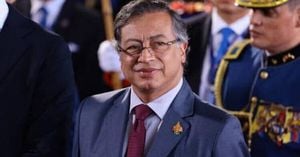Across the United States, allegations of non-citizen voting have sparked intense debate and action, particularly as the 2024 presidential election approaches. The whispers of irregularities, though largely dismissed by experts, are becoming talking points for various political factions, especially among Republicans led by former President Donald Trump.
Recently, the scrutiny intensified after Arizona's Stephen Richer, the Maricopa County recorder, highlighted the presence of approximately 98,000 registered voters whose citizenship has not been conclusively verified. This discovery, originally reported as part of routine voter roll maintenance, led to alarm bells ringing amid claims by Trump and his allies of potential election rigging.
Richer swiftly fought back against these claims, assuring the public, "There’s no sign of widespread voting by non-citizens," and attributing the registration concerns to glitches related to older driver’s licenses issued before the state mandated proof of citizenship. The timing of these assertions, just weeks before the November election, has raised eyebrows and questions about intentions.
Trump, who has continually insisted he was cheated out of Arizona during the 2020 election, pointed to the glitch as evidence of attempts to sabotage the upcoming elections, labeling it as “Trying to Rig the Election!” on his social media platform. Richer, who identifies as a Republican, described Trump's statements as unfounded and said, "We will try to explain to as many voters as we can exactly what is happening."
To make matters more complex, Arizona Secretary of State Adrian Fontes mentioned the problem stemmed from basic voter roll maintenance, asserting the vast majority of those identified without citizenship documentation were almost certainly U.S. citizens. He stressed this administrative hiccup was not indicative of broader electoral fraud.
This situation illuminates the tightrope many politicians must walk, as claims about non-citizen voting reverberate throughout the country. Right-wing factions leverage the issue to bolster their narratives of election integrity, using Trump’s rhetoric as fuel. Consequently, at least eight lawsuits targeting voter registration procedures have been filed across key swing states challenging the ability of non-citizens to register or remain on voter rolls.
Amongst those lawsuits is one filed in North Carolina, alleging nearly 225,000 voters were registered without adequate documentation. The election officials maintain these figures are exaggerated, thereby igniting partisan contention over how voter registration systems operate.
Adding to the conversation, Trump's campaign has declared these lawsuits are aimed at shielding the electoral process from alleged foreign interference, casting non-citizen votes as corrosive elements capable of undermining American democracy. This theme aligns closely with previous arguments from Trump during past election cycles, where he consistently formulated narratives framing his losses as rigged rather than attributed to electoral defeats.
Studies assessing voter fraud incidence, such as one analyzing the 2016 election by the Brennan Center for Justice, paint another picture. They found only 30 instances of illegal voting out of 23.5 million ballots, reiteratively categorizing non-citizen voting as rare and predominantly isolated. Political experts ponder whether the current wave of lawsuits will face similar fates as numerous previous efforts by Trump’s team to overturn the 2020 results, which collapsed amid lack of evidence.
Concurrently, on the legislative front, House Republicans are pushing measures they claim are necessary to secure elections against non-citizen voting. From the Safeguard American Voter Eligibility (SAVE) Act to initiatives requiring comprehensive proof of citizenship, party leaders like Elise Stefanik are vocalizing the perceived risks of lax voting regulations. The argument extends to states like Florida, where the Secretary of State criticized the Department of Homeland Security (DHS) for not cooperating with state-led efforts to remove non-citizens from voter rolls.
Florida Secretary of State Cord Byrd articulated his frustration, declaring the DHS “radio silent” and emphasizing the need for active involvement from the federal government to maintain the integrity of the voter system. Byrd cited Florida's usage of the Systematic Alien Verification for Entitlements (SAVE) database as key to identifying naturalized voters and flagged registered voters who could be non-citizens for counties to screen.
Despite these claims, experts have noted the absence of substantial evidence to suggest non-citizens significantly impact election outcomes. Chuck Coughlin, a political strategist, aptly pointed out, “It’s not happening. It’s a MAGA narrative intended to gaslight Republicans about election integrity.”
This discussion is particularly salient as Trump and Harris prepare for the impending election. Polls indicate Harris slightly leads national numbers, but battleground states remain intensely competitive, setting the stage for possible dramatic electoral contests ignited by fault lines over voting rights.
The road to Election Day could well witness these allegations of non-citizen voting transform from mere talking points to pivotal elements shaping the political climate. Each claim seemingly amplifies public concerns, as election deniers channel their beliefs to galvanize supporters.
To many, the narrative surrounding non-citizen voting is fraught with political peril, raising serious questions about electoral trust and the democratic process as they navigate through increasingly turbulent waters. Whether substantiated or not, claims of voter fraud are poised to be central issues defining these elections, setting the scene for a fight over the core tenets of voter registration and citizenship itself.
With arguments surrounding non-citizen voting ramping up, voters may well find themselves at the heart of another contentious election, where each dispute is awaited not just with rhetoric but legal actions and potential ramifications for electoral integrity.



